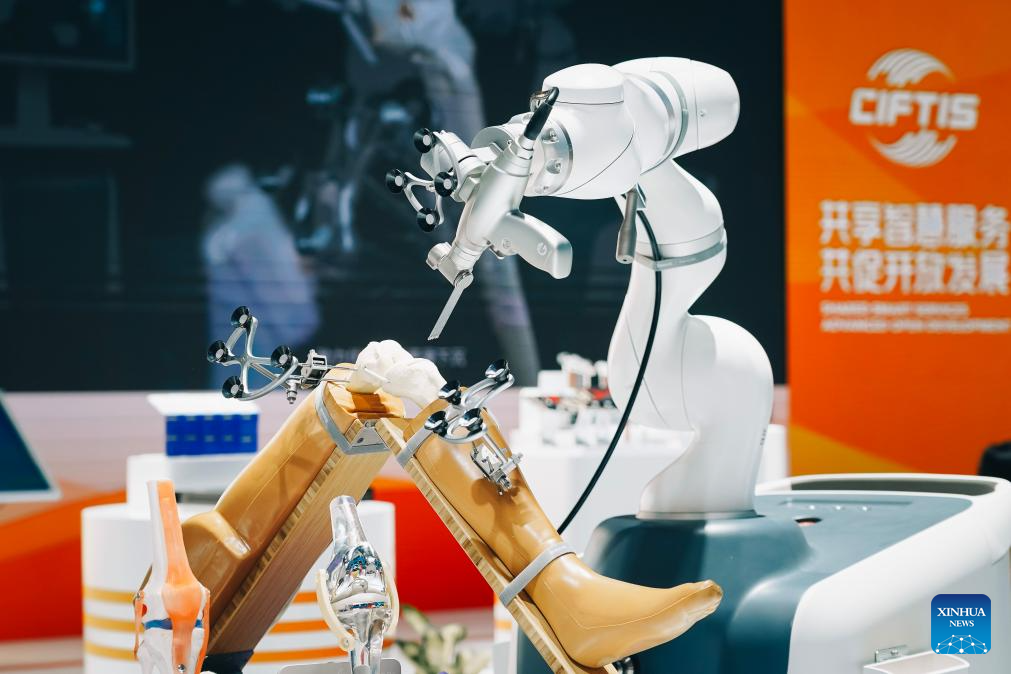
 0 Comment(s)
0 Comment(s) Print
Print E-mail Xinhua, September 16, 2024
E-mail Xinhua, September 16, 2024

This photo taken on Sept. 13, 2024 shows a surgery robot displayed during the 2024 China International Fair for Trade in Services (CIFTIS) at the China National Convention Center in Beijing, capital of China. Themed "Global Services, Shared Prosperity," the 2024 CIFTIS is held at the China National Convention Center and the Shougang Park in Beijing from Sept. 12 to 16. (Xinhua/Cao Mengyao)
A wireless pacemaker that is only the size of a capsule attracted exhibitors and visitors at the ongoing 2024 China International Fair for Trade in Services (CIFTIS).
The pacemaker's developer, Medtronic, one of the largest medical device companies in the world, is a first-time attendee. It has brought over 60 products and solutions to the trade fair.
About 15,000 implanting surgeries have been completed since the pacemaker Micra was launched in China in 2019. Its next-generation, Micra AV2, with smarter algorithms and longer life, is scheduled to be launched in China soon.
Medtronic also launched a remote monitoring system for cardiac implantable electronic devices with local servers in China, which has benefited thousands of Chinese patients with arrhythmia.
Another health giant, Philips, brought various cutting-edge equipment to CIFTIS for its fourth participation, including the artificial intelligent 4D MRI, precision diagnosis and treatment ultrasound system, and super composite operating room, some of which are debuting in China.
China is one of Philips' main growth engines worldwide. Products from Philips' five comprehensive production bases in China have been sold to global markets.
In response to the Chinese government's strategic decision to promote a new round of large-scale equipment renewal and consumer goods trade-ins, Philips launched a new project at CIFTIS to provide tailor-made solutions for technology upgrading and equipment iteration of medical institutions.
Liu Ling, president of Philips Greater China, said CIFTIS provides a broad platform for domestic and foreign enterprises to exchange and cooperate, achieve mutual benefit, and share opportunities.
She noted that China's emphasis on developing new quality productive forces, promoting high-level scientific and technological innovation, and creating a world-class business environment has injected a driving force into enterprises to introduce global wisdom and cultivate local innovation.
Best-selling medical products produced by Chinese enterprises were also seen at CIFTIS.
T20, an ultra-high-throughput sequencer developed by Shenzhen-based MGI Tech, an affiliated company of BGI Group, has been exported to Europe and the Middle East and supports several large-scale projects worldwide.
According to Terence Xiong, vice president for Global Development, BGI Group, the T20 has achieved a global record in sequencing throughput and cost by reducing the cost of whole human genome sequencing to less than 100 U.S. dollars per genome.
China is willing to promote health exchanges and cooperation with other countries, encourage and support the application of medical innovation achievements, and make positive contributions to building a community of common health for humanity, said Lei Haichao, head of the National Health Commission, at an event during the CIFTIS.
(Liu Xin, Li Baojie and Jihang also contributed to the story.)